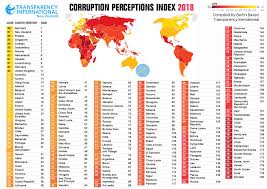By Sherman C. Seequeh
Those who are amused by mere perceptions about corruption in present-day Liberia would be surprised to note that the weird allegations against the current government—having been empirically processed by people schooled in the science of identifying and certifying corruption—are just baseless.
The revered Transparency International and its coalition of anti-corruption watchdog connoisseurs on 11 July, 2019 produced their latest findings about how graft and kleptocracy are faring in the world. A part of the report which will certainly make diehard critics of the George Weah Government tear their clothes off themselves is that Liberia, in the last two years of the Weah presidency, made significant progress in the fight against corruption.
Thank God that the report was not written by Sherman C. Seequeh or the Coalition for Democratic Change or the Ministry of Finance. It was written by a coalition of anti-corruption czars of esteemed international repute and of tested credibility.
The report specifically singled out three countries for having made tremendous progress in the fight against corruption—Georgia, Liberia and Rwanda.
Essentially, this is what Marie Chêne of Transparency International wrote in the report: “Countries like Georgia, Liberia and Rwanda are largely perceived as having achieved remarkable progress in the fight against corruption over the last few years. In the aftermath of the 2003 Rose Revolution, Georgia has been particularly successful in eradicating petty corruption in a very short period of time through several high profile anti-corruption campaigns, including the prosecution of senior corrupt officials, police reform, deregulation and the liberalization of the business environment as well as public sector reform.
“In Rwanda, anti-corruption efforts have focused on strengthening the legal and institutional framework, improving government effectiveness, building a strong and competent public service, reforming public finance management systems, prosecuting corrupt officials at all levels of the public sector, etc.
“In spite of their apparent diversity, these three countries have benefited from certain common conditions that may have contributed to their success in fighting corruption, including a radical regime change or post conflict context which created a momentum for reform, a strong political will to eliminate corruption; and wide public support and demand for anti-corruption reforms.”
From this report, any cool-headed person would know that there is a big difference between the mere hooting of anti-corruption perceptions and sentiments and battle cries for political reasons on the one hand and empirical evidence-finding by unbiased and propaganda-free sources on the other.
In the last one and half years of President George Weah, the clamor to spew anti-corruption tantrums in the name of activism has proven to be mere perceptions fit for the propaganda agenda of a group interested in unnecessarily de-popularizing a regime that is already firmly poised to make a radical break with the institutionalized and governmentalized corruption of the country’s past.
Yesteryears, when journalists and civil society and political actors spoke or wrote about corruption, it was based on empirically established reports and evidences packaged and released by respected organizations, such as the General Auditing Commission, the Anti-Corruption Commission, investigative journalists and international watchdog groups. The reports were based on empirical discoveries of actual apparent commission of fiscal misdeed, and not, for instance, mere legally processed budgetized allotment published on the social media.
Yesterdays, the advocacy for transparency, accountability and probity in Liberia was more about exposing a political administration that was adopting laissez faire, nonchalance and carefree attitude towards corruption. It was more about holding a government that had declared war on corruption to its promise. It was not about ill-conceived stratagem to taint and demonize just for political reasons, even in the face of clear political will to fight corruption and punish those who practice it.
Yesterdays, the advocacy was to pester a head of state who took responsibility for the massive corrupt acts of public officials; it was not to harass and discourage a president taking concrete steps to fight corruption and punish corruption public officials.
As any cool-mined individual would admit, President George Manneh Weah is sacking officials of his government for established evidence of fiscal indiscipline. He’s pursuing scoundrels who took away Liberia’s money to private banks abroad. The 24th Liberian president is acquiescing the prosecution of current and former public servants for corruption.
He’s pushing hard for robust and transparent procurement regime. He has rationalized the civil service to see fresh air of transparency, competency and appropriate incentivization blowing once again.
Thank God that the international transparency umpires of the world have come out with a unanimous verdict declaring President Weah and government guiltless and innocent of all the weird allegations of monumental corruption and the lack of political will to fight corruption. They have ranked the country 120 of 180 with the score of 32 of 100 countries—quite a significant leap from past year’s scores and rankings.
And with a couple of giant steps in the making—setting up special independent prosecutors and commissions to investigate all stolen monies from the state coffers along with new policies to improve the business climate, the procurement regime and virile civil service—it is expected that the President and his government’s ranking in subsequent reports of Transparency International will shoot further up.
I know that there is an ill-conceived motive for the noise about corruption, corruption and corruption, or about wolf, wolf and wolf, where there is no wolf. Chief of this is to effectively blur if not erase the difference between the wrongs of yesterday and the rights of today, so that the “unlikely ones” who took state power a year and half ago to the annoyance and defeat of the “likely ones” don’t take an iota of credit for anything, let alone the fight against corruption which eluded almost every successive past political administration.
But while Liberians would be blind to the difference and some would not let it be known, independent sources are making the acknowledgment in a very forceful way. This is reason for celebration for some Liberians or reason for endless arguments and denunciation for others.

